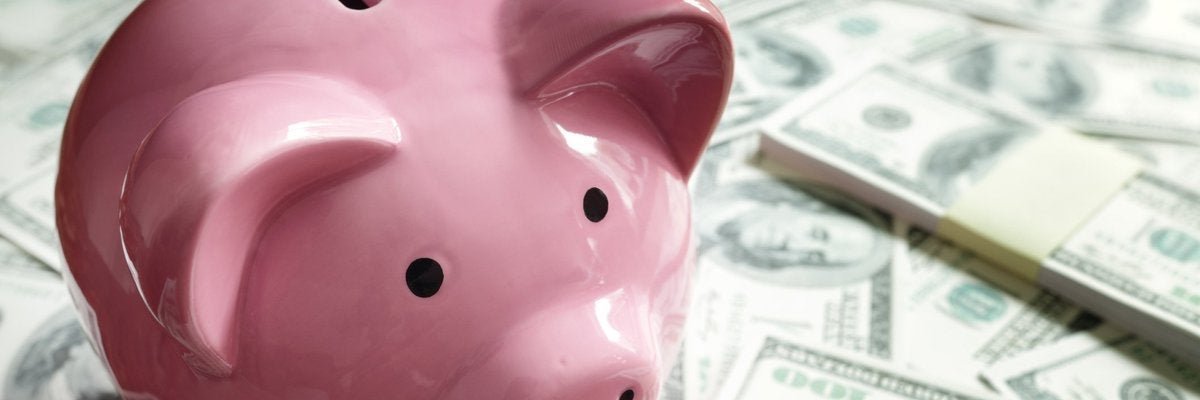The No. 1 Mistake People Make With High-Yield Savings Accounts

Image source: Getty Images
KEY POINTS
- Keeping too much cash in a high-yield savings account could cost you long-term growth.
- Experts recommend capping your HYSA at three to six months' worth of expenses.
- Use a simple "bucket" system to organize your savings and investing goals.
Back in my early 20s, I remember bragging to my cousin one day that my bank balance had crossed the $30,000 mark. I expected a high five -- that's a huge feat for a young saver! But instead, he called me an idiot.
Then he lectured me about something I'd never heard before: financial hoarding.
You see, once your savings reaches a certain point, extra cash stops helping you and starts holding you back.
In fact, holding onto an extra $20,000 in cash could cost you over $348,000 in missed growth over 30 years. Here's how.
Why too much in a high-yield savings account can cost you
High-yield savings accounts are fantastic for your emergency fund and short-term needs. They're safe, they're liquid, and right now the best high-yield savings accounts offer around 4.00% APY.
But even the best HYSA rates can't compete with long-term investing returns.
You might be cheering about your 4.00% HYSA right now. But a simple stock market index fund has historically returned closer to 10% annually.
Let's say you have an extra $20,000 sitting in a savings account. Here's how much it could grow over time if you either left it in savings or invested it and earned 10% per year:
| Years | HYSA (4.00%) | Investing (10%) |
|---|---|---|
| 5 | $24,333 | $32,210 |
| 10 | $29,605 | $51,875 |
| 20 | $43,822 | $134,550 |
| 30 | $64,867 | $348,988 |
Can you believe how much is forfeited by saving cash instead of investing? It's a difference of hundreds of thousands of dollars.
Most people will need at least $1 million to retire comfortably. And saving is not going to get there alone. Investing is what grows your money into real long-term wealth.
By the way -- Getting a 4.00% APY on a high-yield account is historically high. Interest rates are very likely to drop later this year -- and beyond.
Don't have an HYSA right now? Open a Barclays Tiered Savings account and start earning 3.85% APY on your emergency fund.
Try the bucket method to organize your money
One of the most helpful things I ever did was set up "money buckets." Instead of having one giant savings account, I broke my goals down like this:
1. Short-term bucket (0-2 years):
This is all the money you need to keep in cash, so you can access it immediately if needed.
- Emergency fund (three to six months of living expenses)
- Travel fund
- Upcoming large expenses (taxes, home projects)
Keep all this money in a high-yield savings account. It's safe, it's accessible, and it earns great interest short term.
2. Mid-term bucket (2-5 years):
This bucket is for medium-term financial goals. They could be things like:
- Saving for a house down payment or a remodel
- A big move or sabbatical
- A new car purchase
This money might also be suited towards an HYSA given that rates are currently high. But it can also be invested conservatively for slightly higher growth. Certificates of deposit (CDs) are a great place to start.
3. Long-term bucket (5 or more years):
This last bucket is for money tied to long-term goals. Think goals like:
- Retirement nest egg
- Kids' college fund
- General wealth-building
Since you won't be touching these funds for decades, it's OK to invest with a bit more risk. Short-term volatility doesn't matter as much, because the ups and downs smooth out over the long run.
A great place to invest these funds is in your workplace 401(k) plan, an IRA, or a brokerage account.
Need help building a retirement plan? With our partner, SmartAsset, you can get matched with up to three fiduciary advisors so you can get professional advice.
This simple structure helped me get super clear on what my money was doing -- and made it easier to invest confidently without worrying I'd need that cash anytime soon.
The bottom line
Saving money is smart. But once you've hit your emergency fund target, letting extra cash pile up in a high-yield savings account could actually slow you down.
Use the bucket method to stay organized. Keep your short-term cash safe, and invest the rest to let it grow.
Our Research Expert




